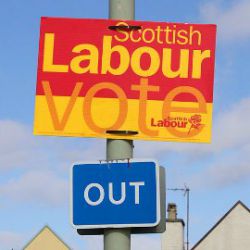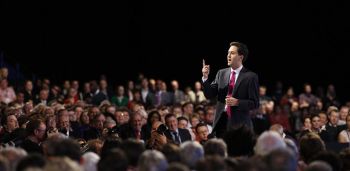
The coming to power of a new Tory government opens a new stormy chapter in Britain. This is not only the conclusion of the Marxists but also of the strategists of capital:
“As the Conservatives revel in their unexpected triumph, they should recognize that victory opens a new and uncertain chapter for the United Kingdom”, warns the Financial Times in an editorial just two days after the election.
“Having played the ‘Scottish card’ during the election, warning about a possible leftist alliance between Labour and the SNP, Mr. Cameron could see the mood curdle into sullen nationalism. The union risks being rent asunder by the collision between two incompatible forces: rampant, spendthrift Scottish separatism and a Tory government committed to austerity. This would be a true winner’s curse.” (FT, 9/5/2015)
“Brexit”
Then there is the danger of Britain leaving the EU. “While Mr. Cameron has promised to renegotiate the terms of UK membership, and deliver a deal his party could recommend for staying in, ‘Brexit’ is an outcome that cannot be excluded”, continues the editorial. Such an outcome would be a shattering blow to British capitalism, dismembered and isolated. It would be a humiliation of historic proportions.

Cameron is being urged to savour the moment now as all hell is going to break loose in the future. “Ahead lie dangerous times – for Britain and for Mr. Cameron’s Conservatives”, writes Philip Stephens in the same paper.
There is no calm in Britain – a feeling of anger, bitterness and disillusionment exists everywhere. While in Scotland it found an expression in support for the SNP, it found no outlet in England and Wales. It is true that the Greens picked up over a million votes, mainly from young people. Even the UKIP vote reflected a certain anti-establishment mood. In fact, the election result reflected an underlying dissatisfaction with all the traditional main parties.
The election result reveals the enormous political volatility and uncertainty in Britain. This is not unique to Britain, however, but is an international phenomenon. On a world scale we have entered an extremely turbulent period, with a build-up of contradictions at all levels. Sharp and sudden changes are now on the order of the day.
World crisis: no end in sight
This has arisen as a result of the world capitalist crisis which exploded in 2008 and which the capitalist governments have not been able to resolve. This has been the deepest crisis of capitalism since the 1930s and possibly in all history. It constituted a fundamental turning point in the situation. The global crisis is a deep-seated organic crisis, affecting the whole system. This means that capitalism has entered a complete blind alley, where the productive forces – industry, technique, science, etc. – cannot be developed as in the past. This new epoch points toward the twilight of the capitalist system from which there is for them no escape.
Along with capitalist crisis has come prolonged austerity with cuts in services and pay. This has served to undermine the market at a time of widespread excess capacity and over-production, further exacerbating the situation. They have tried everything to solve the crisis but have failed. They are desperately shifting from one “solution” to another but to no avail. The only thing on offer is falling living standards everywhere. This has resulted in chronic unemployment, zero hour contracts, low pay, deepening cuts but also in the crisis of the traditional parties and a general mood of anger in society.
“A depression, or a very prolonged recession, does more than create economic hardship”, explains Gideon Rachman, writing in the Financial Times. “It also serves to discredit mainstream ideologies and to whip up anger against political elites — and those effects can last well beyond the point where the economic figures show some improvement.
“A return to growth is also unlikely completely to address the sense of economic malaise in the EU. Across Europe there is a fear that whole nations have been living beyond their means and may have to accept a permanent downward adjustment in living standards. In countries such as Greece, Portugal and Ireland, that adjustment took place in a fairly swift and brutal fashion because of the financial crisis — and has resulted in cuts in nominal wages and pensions.
“But even countries that escaped the worst of the crisis are going through an adjustment in living standards that is hitting the young particularly hard. Rates of youth unemployment are frighteningly high in some countries: above 50 per cent in Spain, nearly 40 per cent in Italy, 23 per cent in France and 17 per cent in the UK. In all these countries, there is a fear that the rising generation will live less secure lives than their parents.
“As a result, even when governments can boast about relatively strong growth, there is disillusionment with the political establishment.” (FT, 23/3/15)
Crisis of the Establishment; crisis of reformism
In other words, the crisis of capitalism now also means a crisis of the traditional parties and a crisis of reformism. The system can no longer offer reforms but only counter-reforms. The economic crisis is leading to a social and political crisis everywhere, as unstable governments are forced to give way to new even more unstable governments. The crisis has been feeding into the consciousness of the working class as well as the middle class. Discontent, anger and bitterness have reached historic levels.

There has been a growing hatred of bankers, financiers, as well as big business, while support for the capitalist system has plummeted. There is a deep-seated loathing of the Establishment everywhere. The crisis of the system has coincided with a whole series of corruption scandals at the very top of society. The old parties have become increasingly discredited.
These attitudes are present in wide sections of the working class, but especially amongst the youth, which have been hardest hit. Illusions in capitalism are evaporating. They are being burned out by events. The hard reality of capitalist crisis is producing explosive levels of discontent in all countries. Therefore, political developments are likely to move at a faster rhythm than in the past, including in Britain.
“Recovery” built on sand
Over the last five years, Britain has experienced deep austerity cuts. Living standards have been hit hard as real wages have fallen at a faster and more sustained rate not seen since 1855, for more than 150 years. Real wages in Britain have fallen by more than in any other country in the G20, including those hardest hit by the crisis such as Italy, Spain and Japan. Not surprisingly, the number of food banks has rocketed and are now servicing some million people.
The British economy has only sluggishly recovered after a prolonged slump. Even this weak “recovery” is not built on productive investment but on consumer spending, which has grown on the basis of credit and savings being reduced. This cannot be sustained. There has been no recovery in investment or exports. The Bank of England has already downgraded its projections for growth. A renewed crisis in Europe will further drag down the British economy. Therefore, the economic picture remains very gloomy.
As a consequence of the crisis, politics in Britain have therefore become very fluid. All the old certainties of the past have disappeared. In 1950, Labour and the Tories took 97% of the popular vote. This election it was just over 65%, reflecting a breakdown of the two-party system, which once provided the stability to British capitalism. We have entered uncharted waters.
Political earthquake in Scotland
The greatest and most decisive shift in the situation occurred in Scotland. This was seen first in the September Referendum of last year over independence which was a massive political earthquake that shook the British Establishment to its very foundations. Astonishingly, the turnout in the Referendum was over 85%, which was the biggest turnout in any British election ever. Some 1.6m people voted for independence, or 45% of the voting population. Less than nine months earlier, opinion polls had placed support for independence at 24%. Within months, the whole political landscape was transformed and reflected a colossal change in consciousness over a very short space of time.

Glasgow, the proletarian centre of Scotland, voted for independence, as did Dundee and other working class conurbations. The majority of the working class, especially its poorest sections, voted YES in a massive display of opposition.
It was seen by many as an alternative to Tory rule and imposed austerity from Westminster. It was not supported for reasons of crude Scottish nationalism, despite being led by the Scottish National Party. In a confused way, the Referendum represented a class vote against the capitalist status quo. The Labour Party became closely identified as defenders, and even part of, the Establishment. This was the conclusion of many, after decades of betrayals by the Labour Party. In fact, the prime reason for the rise of Scottish nationalism was the bitter disillusionment with Labour in Scotland and at Westminster.
The pro-independence campaign served to stir up tens-of-thousands of people to become active in politics for the first time. This had revolutionary undercurrents.
Yet the same mood of anger, bitterness and frustration in Scotland is prevalent also throughout Britain, Europe and internationally for that matter. While in England and Wales there was no outlet or catalyst for this mood, in Scotland it found an expression in the Referendum and the YES campaign.
The immediate effect of the Referendum in Scotland was a tremendous radicalisation to the left of the Labour Party, affecting hundreds of thousands of workers and youth. While the working class hated the Tories and Liberal Democrats, they came to detest the Labour Party, which had jumped into bed with the arch enemies of the working class in the NO campaign. This was simply too much to stomach and those who had traditionally supported Labour in the past turned their backs on the party.
This surge in the SNP’s popularity saw the party’s membership explode to 110,000, up from 25,000 last year. Parties to the left of Labour also grew, with the Greens rising to 9,000, almost level with the Scottish Labour Party. The SSP also grew by a few thousand from a very low point. The SNP’s trade union fraction has more members that the total membership of the Labour Party.
This political earthquake was confirmed in the general election result, where the SNP won 50% of the vote and took 56 out of the 59 Scottish seats. Labour lost 40 of its 41 seats. This was a bigger political shift than in the Referendum. Rather than a return to “normality” following the Referendum, the process has continued and deepened.
The SNP had changed its image long ago from “Tartan Tory,” instead outflanking Labour from the left. Nicola Sturgeon, the SNP leader, placed the party as an anti-austerity party, with growing popularity. She is a clever politician, who stands on the left. The SNP now completely dominates politics in Scotland.
The SNP, however, stands on the basis of capitalism. Their radicalism is verbal radicalism. Where they control councils in Scotland, they have carried through austerity cuts. Their “independence” wishes to keep the British monarchy, keep the pound, remain in capitalist European Union, and cut taxes for business. Sooner or later this programme will collide with the leftward-leaning rank and file.
Nevertheless, the victory of the SNP means a sea-change in politics and will have colossal consequences in Scotland and throughout the rest of the British Isles.
Blairites and the “middle ground”
Ed Miliband stupidly turned his back on the SNP’s offer to “lockout” the Tory party from government. Instead, he had hopes in a deal with the discredited Lib Dems, rather than a “left” SNP. But the Lib Dems were completely smashed in the election, losing 47 seats and reduced to 8.

The Labour leadership’s public conversion to “fiscal responsibility” tied them to the austerity bandwagon. While Miliband made a few left gestures in the latter stages of the campaign, it was too little too late. Labour’s right wing campaign guaranteed victory for Cameron.
The resignation of Miliband has begun an offensive by the Blairites to recapture the leadership of the Labour Party. For them, Labour lost because it was too left wing. The party needs to embrace once again business-friendly New Labour. It needs to appeal to the “aspirational” middle ground. Give the trade union leaders acceptance of the Collins Report, which dilutes trade union influence in the party, it is possible we will see a further shift to the right, as happened in Scotland under Jim Murphy.
Forces beyond their control
The ruling class celebrated the Tory victory as they wanted a strong government to carry through the austerity. But the Tories use of demagogy and rhetoric to gain Little Englander support has set in train uncertain and dangerous forces. “Here, Mr. Cameron must now live with the consequences of his own campaign”, warns the Financial Times. “Tory strategists were unabashed in stirring the embers of English nationalism in order to neutralize the UK Independence Party and stoke fears among the undecided that a Labour government would ‘sell out’ to the Scots.”

Nothing more could serve to stir up nationalism in Scotland. Nothing could fit better the SNP narrative of a progressive Scotland forever shackled by a Tory government at Westminster, carrying out brutal austerity. This will increase support further for the SNP, which will sweep the board in the Holyrood elections in 2016. While a new Referendum on independence has been put on the back burner for now, this is likely to be in the SNP manifesto for Holyrood. The ranks of the SNP will be pushing hard for this, which the leadership will find difficult to resist.
If Tory Westminster denies the Scots their democratic right, it could not be ruled out that the Scots will organise their own referendum. The movement towards independence appears unstoppable. If a second Referendum is granted, there will, under these circumstances, be a sweeping vote for independence.
The proposed Tory Referendum on Europe can also lead to an unintended outcome. Such is the volatility in Britain, continuing brutal austerity, the hatred towards the establishment, a vote to leave the EU cannot be excluded, with all the implications that means in terms of Britain’s prestige and standing in the world. Cameron could therefore preside over the humiliating breakup of the Union as well as being pushed out of the European Union.
Stormy period ahead
We explained before the election that whichever party forms the government will face a horrendous financial and economic position. The government will immediately face a budget deficit of anything between £75b and £100bn. Only 40% of planned cuts were made between 2010-2015. A further 60% are required from the new parliament. This would, of course, get worse if there was another slump, which is on the cards. In other words, austerity will be a permanent feature throughout the next parliament and beyond. Spending is projected to fall to 35.2% of GDP by 2019-20 – taking it to the lowest share in 80 years. Osborne is already planning to stick the knife in with his Summer Budget. Such draconian austerity cuts will mean that the Tory government will very soon face massive opposition. Anger will turn into rage. We could have riots, as in 2011. There will be social upheaval. Unrest will be widespread as people take to the streets. The previous warnings of social unrest by high-ranking police chiefs will become a reality. Already, since the election last week, there have been mass spontaneous protests in various cities against the Tories and their austerity programme.

Workers and youth will be drawing radical and even revolutionary conclusions. Such a prospect did not materialise under the Coalition given the role of the Labour and trade union leaders. They were desperate to keep a lid on the situation. Rather than calling a general strike, they limited the struggle to limited selected strikes that served to demoralise and frustrate the rank and file. They utterly failed to give expression to the real mood in society. Now things will reach boiling point, as indicated by events in Scotland. People have already had more than enough of cuts. They were promised a recovery but they will not get one.
Defeated on the electoral front, the workers will look increasingly to the industrial front. The trade union leaders will again attempt to hold back the mood. But they will face massive pressure from below. A failure to act will only lead to unofficial and illegal action, as well as occupations. It the union leaders continue to resist, they will be replaced by those who reflect the new militant mood.
Whither the Labour Party?
In the past, on the basis of events, we expected a development of a left wing within the Labour Party. This had occurred in the 1920s and 1930s, as well as more recently in the 1970s. However, this development has not yet happened. Clearly, the radicalisation in society, which certainly exists, is not being reflected in the mass organisations at this stage. One of the fundamental reasons for this is the complete degeneration of these organisations over many decades. They have emptied out and become shells. The leadership has long ago come under the pressure of capitalism and has capitulated to these pressures. The Labour leadership is completely bourgeois in its outlook and lifestyle, one from which workers are completely alienated.
With a right wing dominated Labour Party, out of step from the real mood in society, is it possible that there could be mass party created in Britain, like a SYRIZA or PODEMOS? There is obviously a massive political vacuum in Britain and we know that nature abhors a vacuum. In the future, some kind of radical oppositional movement could develop around a figure from outside the political establishment. Under pressure, some big trade unions may end up disaffiliating from Labour and helping to establish a new party.

Given the depth of the crisis all kinds of developments are possible, about which it is difficult to speculate. We must not get carried away. There are important differences between Spain, Greece and Britain, which have different traditions. We must not draw mechanical and premature analogies but follow the situation concretely as it unfolds, preparing ourselves for any eventuality. What is abundantly clear is that such a development will not come from the various ultra-left sects, who are busy attempting to puff themselves up as an alternative to Labor but have failed miserably.
Despite all the cowardice and stupidity of the Labour leaders, it would be a mistake to think that the Labour Party is completely finished, as the sects imagine. Labour still has big reserves of support in society. Moreover, at this stage, there is no mass alternative in existence.
Build the forces of Marxism!
Our main task is to build up the forces of Marxism, in Britain and internationally. The orientation of the Marxists must be to the fresh layers in the working class and in the youth who are looking for a way out of the crisis, and who are open to revolutionary ideas. This layer is not necessarily actively involved in the trade unions at this stage, but in the course of struggle a new and more militant layer of young activists and shop stewards will emerge. It is from these new, fresh layers that the forces of Marxism will be built in the labour movement. This work must be closely linked to our interventions on the streets and amongst students and youth. To reach these layers, we need to be bold and audacious.
As Trotsky once explained, “These are stormy times; the masses are restless; the most intelligent workers are seeking above all to understand what is going on. They will not be satisfied with the mere repetition of current slogans. They must be given a complete answer.” (January 27, 1938)
There has been a fundamental change in Britain. Events are moving quickly. The building of the Marxist tendency will provide us with the necessary forces to intervene in the titanic events that impend and the opportunities that will open up in a revitalised Labour movement. We need to rearm ourselves for this, organisationally, politically and theoretically.
Above all, the new situation requires a bold revolutionary approach to allow us to connect with the best workers and youth. Such work needs to be carried out with all the necessary enthusiasm and a determination to overcome all obstacles.


